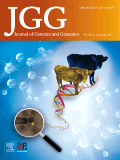
AMERICAN JOURNAL OF MEDICAL GENETICS PART B-NEUROPSYCHIATRIC GENETICS
metrics 2024
Exploring the Genetic Tapestry of Neuropsychiatric Disorders
Introduction
American Journal of Medical Genetics Part B: Neuropsychiatric Genetics, published by Wiley, stands at the forefront of research dedicated to the intricate relationship between genetics and neuropsychiatric disorders. With an impressive scope that bridges various disciplines, this journal serves as a premier platform for groundbreaking studies and innovative perspectives in the fields of Cellular and Molecular Neuroscience, Genetics, and Psychiatry and Mental Health. Featuring a robust impact factor and categorized in the Q1 and Q2 quartiles across multiple relevant categories, the journal has successfully positioned itself as a leading source of high-quality research, ranking 52nd in Cellular and Molecular Neuroscience, 37th in Clinical Genetics, and 157th in Psychiatry and Mental Health within Scopus. Since its inception in 1995, it has sustained a commitment to fostering scholarly excellence and advancing our understanding of the genetic underpinnings of mental health. The journal is poised to continue its mission until 2024 and offers open access options, facilitating wider dissemination of vital knowledge among researchers, healthcare professionals, and students alike.
Metrics 2024
 1.23
1.23 1.60
1.60 2.70
2.70 137
137Metrics History
Rank 2024
Scopus
IF (Web Of Science)
JCI (Web Of Science)
Quartile History
Similar Journals

FOLIA BIOLOGICA
Fostering Discovery in Life SciencesFOLIA BIOLOGICA, published by Charles University Prague, First Faculty of Medicine, is an esteemed academic journal that has been contributing to the fields of Biochemistry, Cell Biology, Developmental Biology, Genetics, Immunology, and Molecular Biology since its inception in 1961. With an ISSN of 0015-5500, this journal serves as a vital platform for researchers and professionals to disseminate their findings and advance knowledge within these disciplines. Despite its current Category Quartiles ranking in the lower tiers (Q3 and Q4), FOLIA BIOLOGICA continues to provide valued insights and foster scholarly dialogue, particularly in its paralleled fields. The journal is headquartered in Prague, Czech Republic, and operates without Open Access options, which emphasizes its focus on curated, peer-reviewed content essential for academicians and students. By bridging theoretical and practical knowledge, FOLIA BIOLOGICA remains committed to enriching the scientific community and serving as a cornerstone for future research innovations.

Gene Reports
Empowering Researchers with Open Access GeneticsGene Reports is a prominent academic journal published by Elsevier that focuses on the rapidly evolving field of genetics. Launched in 2015, this journal serves as a pivotal platform for the dissemination of cutting-edge research, bridging the gap between basic and applied genetics studies. Although it currently holds a Q4 ranking in the Genetics category and stands at the 248th position out of 347 in Scopus rankings, its potential for growth is significant given the increasing interest in genetic research across various disciplines. With an E-ISSN of 2452-0144, Gene Reports aims to provide open access to original research articles, reviews, and short communications that advance the collective understanding of genetic mechanisms and their applications. As a publication that continues to shape the future of genetics, it is an essential resource for researchers, professionals, and students seeking to stay informed about the latest developments in this crucial field.

NATURE GENETICS
Transforming Understanding of Genetic ImpactsNature Genetics is a premier journal in the field of genetics published by NATURE PORTFOLIO, renowned for its impactful research and significant contributions to the understanding of genetic mechanisms and their implications for human health. Since its establishment in 1992, the journal has continually maintained a strong reputation, evidenced by its impressive Q1 ranking in the Genetics category and a commendable Scopus ranking of #4 out of 347 in Genetics, placing it in the 98th percentile. Although it does not currently offer Open Access options, Nature Genetics remains a critical resource for researchers and practitioners, providing cutting-edge studies and papers that drive advancements in both fundamental and applied genetic research. With a global readership and contributions from leading scientists around the world, this journal is a vital platform for disseminating innovative findings and fostering discussions at the frontier of genetics.

NEUROGENETICS
Bridging Genetics and Neuroscience for a Deeper UnderstandingNEUROGENETICS is a distinguished journal published by SPRINGER, focusing on the intersection of genetics and neuroscience. With its ISSN 1364-6745 and E-ISSN 1364-6753, this journal has been a vital resource in the fields of cellular and molecular neuroscience and genetics since its establishment in 1997. As of 2023, it is ranked Q3 in Cellular and Molecular Neuroscience and Q2 in both Genetics and Clinical Genetics, reflecting its growing influence and importance in these areas. Although not an open-access journal, it provides significant insights and research findings that contribute to advancing our understanding of genetic influences on neural function and disease. Based in Germany with an address at ONE NEW YORK PLAZA, SUITE 4600 , NEW YORK, NY 10004, UNITED STATES, NEUROGENETICS serves as a crucial platform for researchers, professionals, and students alike to explore innovative studies that are essential for the future of neuroscience and genetics. With its continuous commitment to high-quality research, the journal aims to foster collaboration and knowledge dissemination among the scientific community.

WORLD JOURNAL OF BIOLOGICAL PSYCHIATRY
Transforming Psychiatry through Interdisciplinary Research.WORLD JOURNAL OF BIOLOGICAL PSYCHIATRY, a premier academic journal published by TAYLOR & FRANCIS LTD, stands at the forefront of interdisciplinary research in the fields of Biological Psychiatry, Psychiatry, and Mental Health. Based in the United Kingdom, this esteemed journal (ISSN: 1562-2975; E-ISSN: 1814-1412) has become increasingly influential since its inception in 2000, with a remarkable impact factor that reflects its high-quality research contributions. The journal is consistently ranked in the Q1 and Q2 categories across various relevant indices, demonstrating its reputation for excellence within the academic community. With Scopus rankings placing it in the top 20th percentile for Psychiatry and Mental Health, the WORLD JOURNAL OF BIOLOGICAL PSYCHIATRY serves as a vital resource for researchers, professionals, and students seeking to further their understanding of the intricate relationship between biological processes and psychiatric phenomena. Despite being a traditional access journal, it possesses a robust scope that encompasses groundbreaking studies, reviews, and advancements in the understanding of mental health disorders, underlining its importance as a key reference in the advancement of psychiatric science and therapeutic practices.

Journal of Genetics and Genomics
Pioneering Research for a Genomic FutureThe Journal of Genetics and Genomics, published by SCIENCE PRESS in China, stands as a significant contributor to the fields of Genetics and Molecular Biology. With an ISSN of 1673-8527 and E-ISSN 1873-5533, this esteemed journal has achieved a remarkable reputation, holding a prestigious Q1 ranking in both Genetics and Molecular Biology as of 2023. This journal not only showcases pioneering research but also fosters vital discussions on contemporary challenges and innovations within genomic sciences. As part of its commitment to facilitating scientific advancement, the journal encompasses a range of research articles, reviews, and short communications, all aiming to illuminate the complexities of genetic structures and functions from 2007 to 2024. Researchers, professionals, and students alike are encouraged to engage with its content, which ranks favorably in Scopus—placing it within the top tier of its categories. Join the community of academic excellence and explore the latest findings that shape our understanding of genomics.

CURRENT OPINION IN GENETICS & DEVELOPMENT
Uncovering the latest trends in genetics.CURRENT OPINION IN GENETICS & DEVELOPMENT is a prestigious journal published by CURRENT BIOLOGY LTD that offers an insightful platform for the latest developments and emerging trends in the fields of genetics and developmental biology. Established in 1991 and set to continue until at least 2024, this journal achieves notable recognition in the academic community with a Q1 classification in both its major categories as of 2023. With a Scopus rank placing it within the top quartile for both genetics and developmental biology, it serves as an essential resource for researchers, professionals, and students seeking to enhance their understanding of genetic mechanisms and developmental processes. While currently not an open-access journal, readers can explore the collection of high-quality articles that contribute to shaping contemporary scientific discourse and fostering innovation within these dynamic fields. For those dedicated to advancing their research and knowledge, CURRENT OPINION IN GENETICS & DEVELOPMENT stands as a vital and influential academic publication.

GENETIC EPIDEMIOLOGY
Bridging Genetics and Epidemiology for Better HealthGENETIC EPIDEMIOLOGY is a pioneering journal published by Wiley that bridges the fields of genetics and epidemiology to advance our understanding of the genetic underpinnings of health and disease. Established in 1984 and converging into its 40th year of impactful research in 2024, this journal offers a key platform for the dissemination of innovative research findings, statistical methods, and applications in both clinical genetics and epidemiological practices. With a robust presence in Scopus, ranking in the second quartile (Q2) for both epidemiology and clinical genetics, it enjoys a significant reputation among its peers. The journal does not currently offer open access, but it is vital for researchers, professionals, and students committed to exploring the evolving landscape of genetic influences on population health. Its rich repository of studies not only enhances knowledge but also informs public health policies and clinical practices worldwide, making it an indispensable resource for those seeking to innovate and apply genetic research in the quest for better health outcomes.

PSYCHIATRIC GENETICS
Advancing Insights into Psychiatric Disorders through GeneticsPSYCHIATRIC GENETICS, published by LIPPINCOTT WILLIAMS & WILKINS, is a pivotal journal dedicated to the interdisciplinary study of genetic factors in psychiatric disorders, bridging the fields of genetics, psychiatry, and neuroscience. With a commitment to advancing research from its inception in 1990 and continuing through 2024, the journal provides a platform for innovative studies and findings that explore the genetic underpinnings of mental health. Although not currently an Open Access publication, it reaches a wide audience concerned with the complex interplay between genetics and psychiatric conditions, contributing to its Q3 and Q2 quartile rankings across multiple relevant categories in 2023. The importance of this journal cannot be understated; it serves as a crucial resource for researchers, clinicians, and students eager to uncover insights that could lead to more effective interventions and treatments in the realm of mental health.

GENES BRAIN AND BEHAVIOR
Bridging Genetics and Behavioral Neuroscience for a Deeper UnderstandingGENES BRAIN AND BEHAVIOR is a leading journal published by Wiley that focuses on the intricate interplay between genetic factors and behavioral neuroscience. With a robust ISSN of 1601-1848 and an E-ISSN of 1601-183X, this journal serves as a premier platform for innovative research that spans across multiple fields including genetics, neurology, and behavioral neuroscience. Recognized for its significant impact with a 2023 categorization of Q1 in Behavioral Neuroscience and Q2 in both Genetics and Neurology, GENES BRAIN AND BEHAVIOR asserts itself as an influential resource for scholars, practitioners, and students alike, facilitating the advancement of knowledge in these dynamic areas. Its Scopus rankings underscore its prominence—ranking #18 in Behavioral Neuroscience and #45 in Neurology, placing it in the top percentiles among its peers. Although not an open-access journal, the rigorous peer-review process ensures high-quality publications, pivotal for those pursuing cutting-edge research and applications. With a history of convergence from 2002 to 2024, this journal continues to foster academic dialogue and discovery in the ever-evolving landscape of brain and behavioral studies.